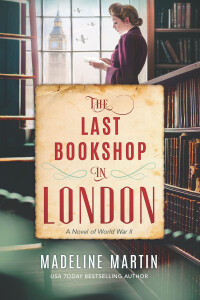
When Grace Bennett lost her mother, she lost almost everything. Her sole relative, an uncle, not only takes over her house but also dismisses her from her job at his store without a reference. She and her more adventurous friend Viv have always dreamed of going to London, so they set off, buoyed by the offer of lodgings with a friend of Grace’s mother.
It’s August, 1939.
Viv gets her dream job at Harrods, but timid Grace has no luck because she has no references. Finally, the fond, if bossy, Mrs. Weatherford bullies the owner of a struggling bookshop into hiring Grace for six months so she can get the necessary reference.
Primrose Hill is barely staying afloat because it is far away from Paternoster Row, home of most of London’s bookstores, and its owner Mr. Evans is not much of a businessman. Grace is nervous: she’s not a reader, so how can she recommend books to customers?
However, her retail experience helps her make the shop more organized and attractive, and she finds the kindness lurking under Mr. Evans’s gruff exterior. She also enjoys the customers, especially George whose encouragement finally gets her to start reading.
Then war comes, with blackout curtains and the Blitz. Amid loss and constant fear, Grace volunteers as an ARP (Air Raid Precautions) warden, coincidentally paired with the grumpiest of the store’s customers, sending her out on the dark nights during the worst of the bombing. She takes refuge in her new passion: reading. On the nights she’s not on duty, when she and Mrs. Weatherfield sleep in the subway tunnels, she’s persuaded to read aloud to help others pass the time and distract them from their fears.
This second in a string of bookshop books for me starts out as a light read, but quickly turns serious with the start of World War II. The story eloquently depicts the home front: the women and old men left behind, the first attempt to find your way home in the blackout, the fear at the sound of the doorbell because it could be someone delivering a telegram, the sounds and smells of sleeping in the tube station turned air raid shelter, the attempt to extinguish incendiaries, the shock—first physical and then emotional—of a bomb blast.
What I most admire in this story is the way Martin integrates the larger story of the war with Grace’s particular journey. The grim accuracy of life in London during the Blitz, and all the losses—loved ones, homes, security—keep this from being a frothy romance or coming-of-age story. The war is not just pasted on to add drama; it informs everything in Grace’s story, from large events to the smallest detail.
What novel have you read that incorporates events current to the story?
